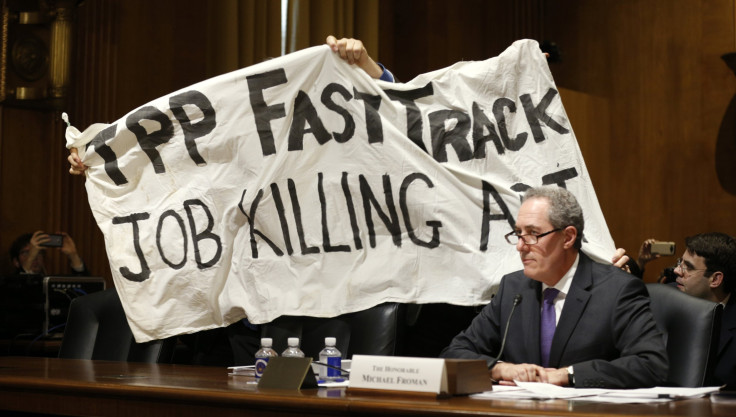
The U.S. Senate agreed thursday to fast-track the Trans-Pacific Partnership (TPP), a free-trade agreement that would have far-reaching legal repercussions in the U.S., Asia, Australia, and Latin America. The agreement was reached after Senate leaders agreed to aid workers that would be hurt by the deal, according to Reuters. Fast-tracking -- voting on a TPA bill -- basically means that the TPP won't be debated. It's limited to an up-or-down. Amendments can't be added, and the bill can't be subjected to the filibuster or other parliamentary maneuverings.
"You can't fast track fast track - that's a complete abdication of our responsibilities," Senator Sherrod Brown (D-OH) told Reuters on Thursday. Earlier in April he criticized the TPP at a union event, comparing it to the North Atlantic Free Trade Agreement (NAFTA).
“Our trade deals amount to corporate handouts and worker sellouts. [American Workers’] ability to compete has been hamstrung by NAFTA-style trade deals. Trade done right creates prosperity—a leveling the playing field for all companies, strengthening the middle class and lifting workers from poverty. But we cannot allow another trade deal negotiated in secret to shortchange our workers and ship jobs overseas. The last thing we need is another NAFTA.”
"It is a common understanding with the New Zealand trade minister that the [fast-tracking] is extremely important for the TPP agreement. This is also a shared view among member nations," Akira Amari, Japan’s Economics Minister, said in March.
Japan is one of the 11 countries -- including Mexico, Peru and Chile -- involved in the Trans-Pacific Partnership, whose impact will be felt across many areas of trade, including healthcare, human rights, patent protection and tariffs. Despite criticisms by groups focused in each of those areas, President Obama has publicly supported the bill.
“Those who oppose these trade deals ironically are accepting a status quo that is more damaging to American workers,” Obama told business leaders in 2014. “There are folks in my own party and in my own constituency that have legitimate complaints about some of the trend lines of inequality, but are barking up the wrong tree when it comes to opposing TPP, and I’m going to have to make that argument.”
Another NAFTA?
Opponents of the bill argue that NAFTA, too, was passed under the guise of helping American workers.
“NAFTA means jobs. American jobs, and good-paying American jobs. If I didn’t believe that, I wouldn’t support this agreement,” President Bill Clinton said on signing the 1994 treaty. He argued that an anticipated “export boom to Mexico,” would create news jobs. Like Obama, he defended the agreement from to sceptical Democrats, claiming that free trade “transcends ideology.”
The left has seen NAFTA as a failure for American workers. It’s been called the “the door through which American workers were shoved into the neoliberal global labor market” by left-leaning think tanks like EPI. In a 20-year review of the agreement, a Public Citizen report said that corporate and political promises that NAFTA would create jobs was never fulfilled. Even right-leaning think tanks have criticized elements of the bill that would amount to international corporate subsidies.
However, other studies that compared outsourcing to Mexico with outsourcing to China called the job losses a myth. As study by the Congressional Research Service noted, it’s nearly impossible to measure the economic effects of a specific free trade agreement like NAFTA and separate it from the other factors that drive a major economy. In other words, figuring out what’s really going on between different economies is hard. Instead of tackling that challenge head-on, today’s announcement indicates that the Senate just wants to push TPP through.
© 2025 Latin Times. All rights reserved. Do not reproduce without permission.




